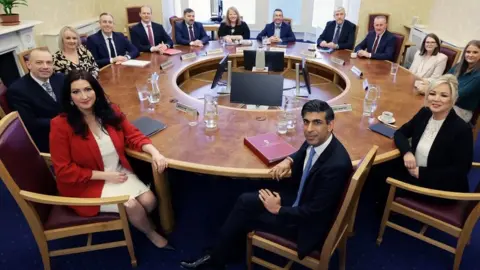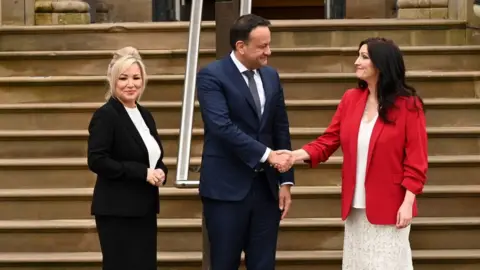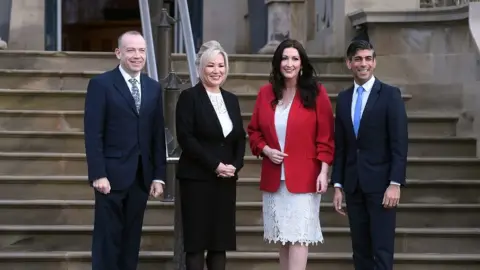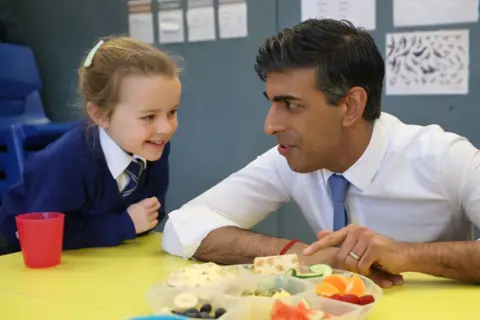Stormont: Rishi Sunak and Leo Varadkar visit as power-sharing work begins
 Kelvin Boyes/Press Eye
Kelvin Boyes/Press EyePrime Minister Rishi Sunak and Taoiseach (Irish PM) Leo Varadkar have visited Stormont to mark the return of power sharing in Northern Ireland.
They met for what the taoiseach called "a very good meeting".
They also met political leaders separately, including First Minister Michelle O'Neill and Deputy First Minister Emma Little-Pengelly.
Mr Sunak said the new deal would protect Northern Ireland's place in the union.
He said the return of devolved government was a cause for optimism.
Mr Varadkar would not be drawn on the question of a united Ireland, instead saying the assembly's return showed the Good Friday Agreement was working again.
 PAcemaker
PAcemakerHe said the new ministers were "keen to get into their briefs" and the Irish government was "here to help".
Speaking ahead of the first meeting of the Northern Ireland Executive - the ministers which direct policy and make decisions - Ms O'Neill said "today is a good day".
She said the parties in the executive - her party Sinn Féin; the Democratic Unionist Party (DUP); the Ulster Unionist Party (UUP); and Alliance - had "committed to working together".
Ms Little-Pengelly echoed the first minister's comments saying they were "very conscious of the big issues to tackle".
What did Mr Sunak and NI ministers discuss?
One of the major issues being pressed by ministers is how Northern Ireland is funded.
The executive ministers wrote to Mr Sunak calling for a new funding model that offers "long-term sustainability", while Ms O'Neill has previously described it as the executive's priority.
The government has already pledged to provide a financial package worth £3.3bn to any newly-formed executive at Stormont.
Mr Sunak described this package as "a generous and fair settlement for Northern Ireland".
 Oliver McVeigh
Oliver McVeighMeanwhile, Northern Ireland Secretary Chris Heaton-Harris told Good Morning Ulster that a Fiscal Council reported indicated Northern Ireland was properly funded and questioned figures used by ministers to call for funding changes.
He added that civil servants "have been wrong in the past".
However, both the first and deputy first ministers said it was an issue they raised with Mr Sunak.
Mr O'Neill said incoming ministers had "in-trays as long as your arm" but proper financial arrangements had to be in place in order to deal with these.
Ms Little-Pengelly said: "We want to make sure that this executive has the right tools and sufficient resources to do what it needs to do
"We are up for that challenge and we are up for a very constructive working arrangement to try to tackle those issue together."


In this letter, the new Executive is effectively saying the financial package announced before Christmas is almost guaranteed to lead to another budget crisis at Stormont unless it is revised.
Ministers therefore want the reopening of negotiations on significant elements, most notably the "fiscal floor".
It is based on the devolved funding model in Wales, where it was recognised that demographic differences make it more expensive to deliver services compared to England.
The government agreed that Wales should be funded at a 115% of England's level. In other words for every £100 per head spent on public services in England, there should be no less than £115 per head for Wales.
The government has also accepted a similar model for Northern Ireland with per head funding to be set at 124% of England's level.
Stormont's ministers say this is too low and has not been subject to robust independent assessment or analysis.
They believe the starting point should be 127%, with a case for it to go higher.
The difference may sounds small but over time it would represent billions of pounds of additional funding.

DUP leader Sir Jeffrey Donaldson said on Monday morning he would also be speaking to the prime minister about the issue and would be "unapologetic" in those discussions.
"Northern Ireland is funded below the level of need," said Sir Jeffrey, who does not sit as an assembly member at Stormont because he is an MP at Westminster.
"We need the government to go a bit further so our finances are in a sound position."
What else did the PM do in NI?
It was Rishi Sunak's seventh visit to Northern Ireland since he took office, but his first time visiting with a fully functioning government in place.
He arrived on Sunday night and met volunteers and crew at the Air Ambulance charity, as well as families of those who have been helped by the service.
On Monday morning he and the Secretary of State Chris Heaton-Harris were welcomed to Stormont Castle by the First Minister Michelle O'Neill and Deputy First Minister Emma Little-Pengelly.
Whilst there, he also met with the Taoiseach Leo Varadkar.
Later, he visited Glengraig Integrated School in Hollywood, County Down, handing out healthy snacks to Primary 2 pupils and joining school prefects in the library for a question and answer session.
 PA Media
PA MediaHow was power sharing restored in Northern Ireland?
The return of power-sharing came after months of negotiations involving the government and the DUP, Northern Ireland's largest unionist party.
It withdrew from power-sharing in February 2022 in protest at post-Brexit trade arrangements for Northern Ireland, agreed between the UK and EU.
Last week, DUP leader Sir Jeffrey Donaldson announced his party had a reached a deal with Number 10 that means no "routine" checks on goods crossing from Great Britain to Northern Ireland.
He said on this basis, and with legislation passed at Westminster to implement more changes, his party would return to government.
That decision culminated in the restoration of the power-sharing institutions on Saturday, two years to the day since the DUP walked out of the executive.
The move has been widely welcomed, with US President Joe Biden saying "a government that finds ways through hard problems together will draw even greater opportunity to Northern Ireland".
On Monday, former President Bill Clinton, who was in office when the Good Friday Agreement was signed in 1998, posted his "congratulations to all party leadership on this important step".

More on power sharing in Northern Ireland
- FIRST MINISTER PROFILE Who is Michelle O'Neill?
- DEPUTY FIRST MINISTER PROFILE: Who is Emma Little-Pengelly?
- ANALYSIS: Balancing act ahead for first minister
- EXPLAINER: What issues are in new NI ministers' in-trays?
- BACKGROUND: A history of NI agreements (and disagreements)
